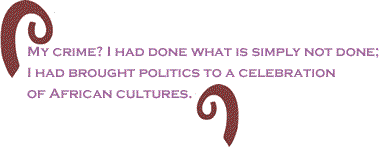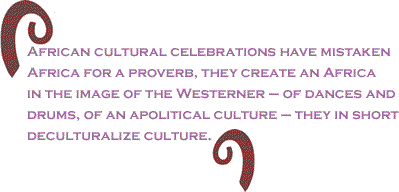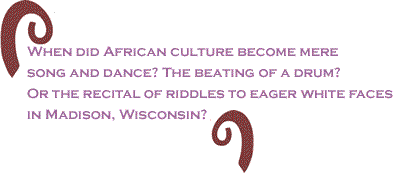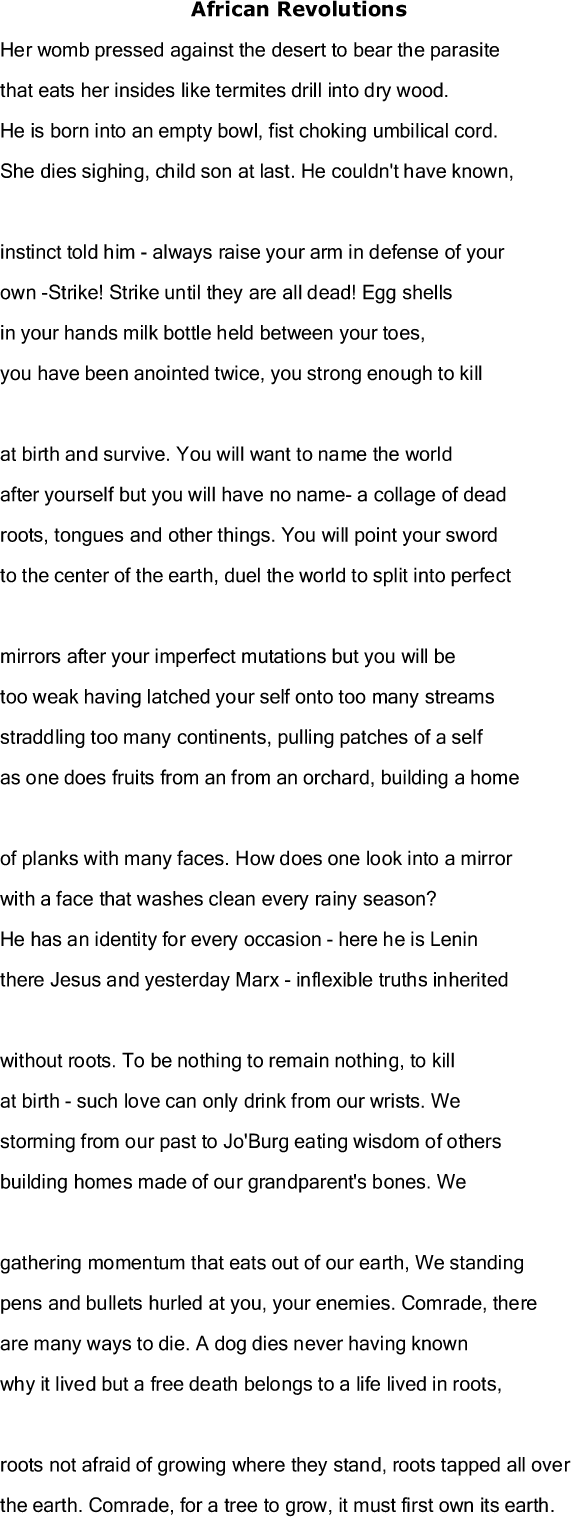
|
|||||||||||||||||||||||

|
|

Custom Search
|
|
 |
|
Restoring a radical discourse on Africa – these words, I felt, had gone awry right from the moment they escaped my tongue; or rather, as soon as with great effort I rolled them down my tongue, and into the microphone only to see them spill at the feet of the audience. Caution - Enter at your own Risk. As I read my poem, African Revolutions, I kept hearing the words rushing down the podium with the constancy of a fast moving train so certain on set rails – and on eventual destruction. I couldn’t pull the brakes. What a way to introduce a poem! Couldn’t I have simply said poems do not need introduction and ushered in mine, alone to fend for itself with neither preface nor epilogue? I rolled out line after line, Her womb pressed against the desert to bear/ the parasite that eats her insides like termites drilling dry wood/ he is born into an empty bowl, fist choking umbilical cord until mercifully the sigh of the last line – for a tree to grow comrade, it must first own its own earth. Finally I was done. As I walked back to my sit on the stage, followed by silent and polite applause, I pondered over the landscape I had suddenly fallen upon. My crime? I had done what is simply not done; I had brought politics to a celebration of African cultures. Now, ready yourself for a stray quote from Fanon – “Every generation must out of relative obscurity find its mission, fulfill it or betray it.” But here the earth’s wretched have gathered for a banquet – what polite conversation shall accompany the clinking of the champagne glasses? What hungers do those black hands cradling the stem of a wine glass reflect? My offer in place of the proverbial proverb - A radical discourse – yes, a bit self-righteous as most activists are. I will even admit to a tinge of poetic affectation - but what does radical discourse mean? Let us start at the beginning. A few years ago, I was invited to read a poem at an African Cultural Festival in Madison, Wisconsin. I was particularly pulled by the mission of the occasion, which was to build bridges across the African Diaspora. Africans are not visible to each other and any mission that makes us less estranged to each other is to be welcomed. Most Kenyans for example have not met a Senegalese and vice versa. So, perhaps I should put a disclaimer here and say that cultural festivals are intrinsically of good value. That it is a good in itself to see Africans and friends coming together under the banner of the Diaspora.
But why such a disclaimer? Let me lay it all out here – African cultural celebrations have mistaken Africa for a proverb, they create an Africa in the image of the Westerner – of dances and drums, of an apolitical culture – they in short deculturalize culture. When did African culture become mere song and dance? The beating of a drum? Or the recital of riddles to eager white faces in Madison, Wisconsin? Cultural theorists quote from Socrates, Hegel, Marx, Rousseau, Foucault, Derrida and even Machiavelli, but when it comes to Africa a few proverbs suffice. There is a lot at stake here. Imagine the following equations. Western political philosophy - He that is master of himself will soon be master of others. Hegelian dialectics – one plus one equals two. Newtonian physics – what goes up surely comes down. Marxist philosophy – it takes a village to raise a child. Aesthetics – Beauty is in the eye of the beholder. It doesn’t add up to infantilize Western philosophy like this – Western thought is not immediately reducible to a set of wise sayings. Why is it to so easy to seamlessly move from Western philosophy to African proverbs? Why is it so easy to ascribe and celebrate philosophy in the West and laugh and embrace African proverbs in place of African philosophies?
Here is the kicker – all cultures have the equivalent of proverbs. But while in Africa they are called proverbs, in the West they are termed aphorisms. That is, you never hear of Western proverbs because they have been given a better name. The dictionary definition of an aphorism according to the American Heritage Dictionary is – “A concise and often witty statement of wisdom or opinion, such as ‘Children should be seen and not heard.’” A proverb on the other hand is “A short pithy saying in frequent and widespread use that expresses a basic truth or practical precept.” They are one and the same thing, but aphorisms do not stand in the place of Western thought. Yet proverbs are confident metaphors of African thought. If we were to follow Kwesi Wiredu’s How Not to Compare African Thought with Western Thought, we would compare aphorism for proverbs, historical period for historical period, and Western philosophical thought for African philosophical thought. We would compare a dynamic African culture to a dynamic Western culture. Now try this for size; in Western philosophy you talk about Antinomy – a logical contradiction – not an oxymoron – because meaning is contained in the clash of its competing claims – An earlier version the Hegelian dialectic. In Zulu culture you have umuntu ngumuntu ngabantu - A person is human being through other people. This concept, usually treated as a proverb is really an antinomy – that is, my humanity is dependent on your humanity, I cannot be a human being alone. The Zulu antinomy is a summation of Ubuntu philosophy, in the same way the movement from thesis, antithesis to synthesis is a summation of the Hegelian dialectic. It is not a proverb.
African philosophy is one of the most exciting fields in African scholarship today. This is where the battle for the African mind (for this is what is at stake) is taking place, where the great questions of existence, with African thought at the center, are being debated. Were there African philosophers before colonialism? The late Odera Oruka argues that amongst the Luo existed sage philosophers – that is, a group of men and women who were known and respected as carriers of philosophy. In literature, what could be more philosophical than Wole Soyinka’s Fourth Stage, where he uses Yoruba mythology to talk about tragedy in theater? Or the concept of permanent transitions, the Abiku child as fictionalized in Ben Okri’s Famished Road? But let’s get back to the African Cultural Festival. Three prayers were offered to give thanks and bless the day, each led by an African Muslim, a Christian and, a non-Muslim/Christian African, the latter representing a myriad of African religions. To me, the optimism with which each religion graced the stage was misplaced. Indeed it was putting in theater form, Ali Mazrui’s triple heritage theory of religions and civilizations (Western, Islamic and African) finding a happy polygamous marriage in Africa. Mazrui always fast on his feet with a quick fix, argues that Islam, Christianity/Western Culture and African cultures co-exist and intermingle peacefully in Africa - and that Africans are all the more culturally richer for it. Yet nothing has caused more violence in Africa that the meeting of these three civilizations, each claiming the right to lord over the African, each manipulated by the political elite to keep the Africans at the bottom of the triple heritage pyramid weak and divided. Where do we find Du Bois double consciousness in the triple heritage? Where is the African afflicted with “two souls, two thoughts, two unreconciled strivings; two warring ideals in one dark body, whose dogged strength alone keep it from being torn asunder?” The Herero genocide by the Germans in Namibia, Leopold’s killing machine in the Congo, and Britain’s gulag as historian Caroline Elkins calls British colonialism in Kenya – all in absentia. This history did not inform the gesture behind the prayers. After the clerics had triply blessed us, Daniel Kunene, a South African poet and freedom fighter, tall with a head full of gray hair but with the calmness of a murmuring volcano, led us into singing the African national anthem. Many times in the 1980s in Kenya we sang this anthem in solidarity with South Africa. He introduced the poets and we huddled onto the blessed stage, promptly occupying one side of it ready for quick dispensation. I was sitting closest to the podium, therefore was first to read. I was sweating. I managed a quick smile to two of my friends in the audience. I said my piece and was followed by another four poets. One read a piece on Senghor. Unfortunately I couldn’t hear most of it, sitting behind the speakers, and cannot render an accurate reading of her reading of Senghor – but at least I didn’t hear the words black prince or you, African warrior who made us black again. Two young poets followed and read quite well though for the life of me I couldn’t understand why they decided to translate one of their poems from English to French – unless they were speaking to that great divide between the Anglophones and Francophones, a divide that we should find ridiculous and simply refuse. These baptismal names - Francophone, Anglophone, and Lusophone - that Africans go by should be returned to the owners. This divide that follows the borders created by the imperial powers in the 1884 Berlin Conference is probably the single most important challenge to Pan-Africanism today. To go to Mali from Kenya, you apply for a visa at the French consulate in Nairobi. To get to Kenya from lets say Senegal, you retrieve a visa from the French consulate in Dakar. Why is the relationship between Africans still being mediated through their former colonizers? A Moroccan poet followed the two young poets. She performed her poetry powerfully. One of her poems was about love. I had thought about reading a love poem – we tend to forget that even suffering people fall in love but at the last minute decided against it, seeing as to how there was already too much happiness.
We dragged the poems out too long. Let’s face it, poetry, unless well performed is a medium best taken in small doses. So it was with great relief that Daniel Kunene closed out the poetry section with a poem that sought to contextualize us not only in a post-September 11th world but in history, for history did not die only to be birthed by Bush; to the contrary, Sept. 11th is but a speck in a continuum. His poem spoke of this crime that took the lives of 3,500 people and then asked what of the thousands, indeed millions who have lost their lives at the hands of oppression? What of the lives lost in Mozambique, Angola, South Africa, Algeria, Zimbabwe and Rwanda? Indeed, didn’t Vietnam lose a million lives compared to the 3,500 American lives lost on 9/11? I suppose there is no need for me to go on in this manner; you can see where I am heading. The cultural festival simply played out a part given to it by history – that is the role of denying the African complexity. That the cultural festival with an exception of Kunene’s poem (and dare I thrown in mine?) was so apolitical as to seem almost deliberate. Africans in the United States tend to isolate themselves from the political shenanigans of their host country. Africans who, because they have an accent are seen as foreigners, or because they are students in good standing, or are professors, or have professional jobs, are exempt from police racism – we have what I have to refer to as the foreigner privilege. The foreigner privilege puts the racist at ease – you will not be here too long, you must be educated, you are not like them- and of course we eat it up and start seeing other minorities through racialized eyes. Africans
in the US view the African American as whites view them – as ingrates
of the great American democracy, drug addicts, and welfare queens
– who deserve the prison-industrial complex. This not to say that
there isn’t a strong tradition of African and African American solidarity
– Du Bois, Kwame Ture, George Padmore, Malcom X to name a few. But
at the bottom, Africans and African Americans view each Now there is nothing wrong with dancing or drumming or for that matter celebrating our existence (indeed I saw the most amazing dancer and drummer, who in my opinion defines what it means to be a truly gifted artist at this festival). God, Allah, Ngai or even a great void understands that the African must create spaces in which the day’s troubles have to be denied their reach and give us some respite. But even in these spaces, we have to be in a true dialogue with each other. That is the difference between escapism and a healthy confrontation; one declares a problem non-existent and the other embraces the day’s challenge and seeks ways to subvert it. One is afraid; the other is brave in that it demands a full human existence. Let us talk of historical debts, of historical connections in a common struggle. Let us not forget the white Appalachian who has black lungs from working in the coal mines, the Puerto Rican and Native American, and African American freedom fighters still in jail.
Let us eat, dance, drum in celebration of these constant and unbroken bonds. In the evening let us gather around as in a palaver and plot how to free ourselves, how to further this struggle that started the moment when one of group of people decided it is human nature to subjugate others. The Africa we had on stage was not the Africa I know even though I know of drums and proverbs. I simply could not recognize it, that Africa forgets, it has no memory; it has no past, and certainly does not have an eye on the future. And it scares me. It scares me for anything that eats its memories, that eats its past, that so casually ignores the pain of others with whom it shares a common destiny, that laughs and dances without misstep or doubt is a mirage. It scares me because it is attractive and easy to live in. So I keep reminding myself that those that see a mirage in a desert still die of thirst. Culture cannot be silent, it is not a drum, and it is not a proverb. I suppose this what I have been saying all along – culture is struggle.
BlackCommentator.com Guest Commentator, Mukoma Wa Ngugi, is a writer
and political analyst, the author of Hurling
Words at Consciousness |
|
Any BlackCommentator.com article may be re-printed so long as it is re-printed in its entirety and full credit given to the author and www.BlackCommentator.com. If the re-print is on the Internet we additionally request a link back to the original piece on our Website. Your comments are always welcome. eMail re-print notice
If you send us an eMail message we may publish all or part of it, unless you tell us it is not for publication. You may also request that we withhold your name. Thank you very much for your readership. |
|
| |
|
| April
23 , 2009 Issue 321 |
|
| Executive Editor: Bill Fletcher, Jr. |
| Managing Editor: Nancy Littlefield |
| Publisher: Peter Gamble |
| Est. April 5, 2002 |
Printer Friendly Version
in resizeable plain
text format or pdf
format. |
| Frequently Asked Questions |
 |

|
 |
 |
 |
| |
| |








































